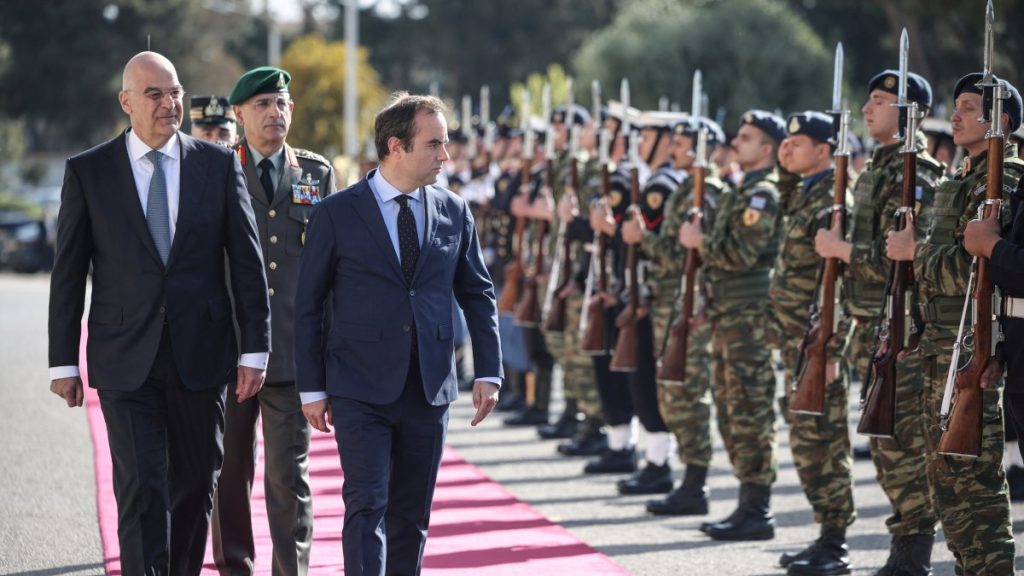Greece signed a deal to buy anti-ship missiles from France on Monday amid a shopping spree to boost its defenses, days after the country’s military chief openly threatened Türkiye in a maritime dispute.
The agreement for 16 French-built Exocet missiles was signed by Greek Defense Minister Nikos Dendias and France’s Armed Forces Minister Sebastien Lecornu, who is visiting Athens. The cost of the deal was not disclosed.
Under a defense pact with France signed in 2021, Greece agreed to buy three French frigates and some 24 Dassault-made Rafale fighter jets.
In addition, Greece has said it will buy a fourth Belharra frigate and cruise missiles from France, as part of a 25-billion-euro defence plan by 2036 to modernize its armed forces as it seeks to keep pace with its neighbour and historical rival, Türkiye.
Although NATO allies, Greece and Türkiye, have long-standing disputes over boundaries in the Aegean Sea and eastern Mediterranean that have brought them close to war several times in recent decades.
“Greece does not threaten, but is threatened,” Dendias said in joint statements with Lecornu. The two ministers did not take questions. Contradicting Dendias, the Greek army chief indeed threatened Türkiye. Country’s Chief of General Staff Gen. Dimitrios Houpis said at an economic forum earlier this month that they were ready to “intervene in five minutes” to Türkiye, accusing the latter of what he called “revisionist tactics” regarding the maritime boundaries.
Speaking in Parliament earlier this month, Dendias said Greece plans to shift from traditional defense systems to a high-tech, networked strategy centered on mobile, Artificial Intelligence-powered missile systems, drone technologies and advanced command units – reducing reliance on conventional fleets.
Greece’s modernization drive – launched after years of defense cuts during the 2010-2018 financial crisis – already includes all branches of the armed forces and focuses on cooperation with France, Israel and the United States.
Türkiye, on the other hand, boasts a flourishing defense industry and less reliance on imports for its defense needs.
Greece, a member of the European Union and NATO, already spends about 3% of its gross domestic product on defense. That is nearly double the average in the EU, which is under pressure to bolster defenses as its 75-year-old NATO alliance with the U.S. comes under strain.
The country also aims to develop an anti-aircraft and anti-drone dome called “Achilles Shield” and to pay for 20 F-35 fighter jets that have been ordered from the U.S. Under its new defense plan, Greece will upgrade older F-16 fighter jets to “Viper” level and four German-made MEKO 200 frigates already serving in the navy. The plan follows already-announced plans to buy a new long-range rocket artillery system with a range of up to 300 kilometers (186.4 miles). Most of these will protect Greece’s northeastern border with Türkiye and its islands in the Aegean.
Dendias, who is accused of undermining reviving ties with Türkiye by Turkish officials, said last December that the country faces a “real war threat” from Türkiye as he defended almost doubling the defense expenditures of Greece. Spending for the defense ministry will rise to 6.1 billion euros ($6.5 billion) from 3.6 billion euros due to increased equipment deliveries in 2025. “Is this spending too much? Whoever is positioning themselves on this needs to explain what criteria they are considering. Is the country threatened? And where is the main threat to the country coming from?” Dendias told the Parliament in December, noting that Türkiye spends 26.8 billion euros on armaments.
Greece is one of 21 countries participating in the European air defense system, European Sky Shield, which was initiated by Germany, but the government in Athens thinks progress is too slow. Türkiye, too, has unveiled its own “Steel Dome” system recently and already boasts a defense budget far higher than Greece, which is its NATO ally. Unlike Greece, Türkiye relies on its own locally made arsenal in its “Dome” and other areas, particularly uncrewed aerial combat vehicles.
After a long period of tensions marked by disputes over irregular migration, the Cyprus dispute, energy exploration and territorial sovereignty in the Aegean, Türkiye and Greece have been taking confidence-building steps for a fragile normalization of their relations, which moved into a new chapter with President Recep Tayyip Erdoğan’s landmark visit to Athens in December 2023.
While officials on both sides have expressed commitment to maintaining the positive climate, the issues are longstanding and deep-rooted, and neither side expects the process to be without turbulence, particularly in the Aegean, where Turkish and Greek jets often scuffled until very recently. Ankara has repeatedly warned its neighbor against entering an arms race with Türkiye, particularly on building a military presence on the disputed Aegean islands since the 1960s, in violation of postwar treaties. Greece’s purchase of F-35 fighter jets from the U.S. and the upping of defense budgets are meant to counter the protection of Turkish interests in the Eastern Mediterranean. Greece says it needs to defend the islands against a potential attack from Türkiye, but Turkish officials said continued militarization of the islands could lead to Ankara questioning their ownership.


